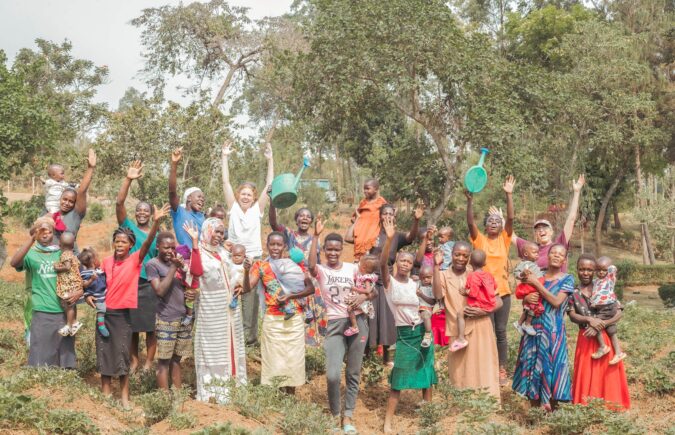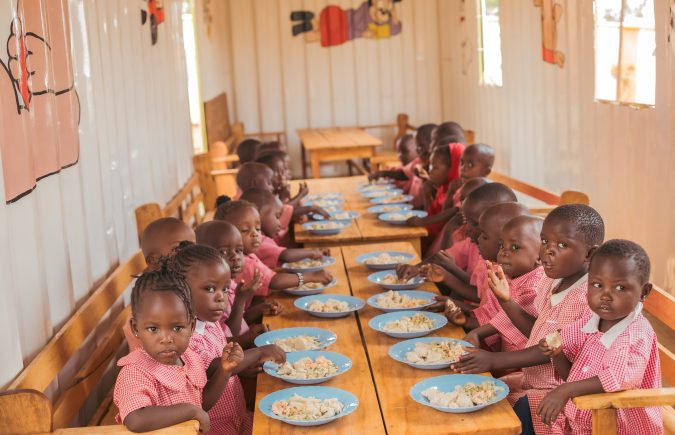Early Childhood Development Centres – Noah’s Ark and St Irene’s
What are Early Childhood Development Centres?
Early Childhood Development (ECD) Centres are the pre-primary school level of education in Kenya. ECD centres cater to children between the ages of 4-6.
The Nasio Trust runs two ECD Centres to ensure that every child
- Has access to good-quality education
- Has school materials including uniforms and books
- Is healthy and has medical cover
- Has their basic needs met including food, clothing, and bedding
Noah’s Ark
Noah’s Ark Day Care Centre was the first project set up by The Nasio Trust. It began as a road-side kiosk in Mumias where it catered for the needs of 16 disadvantaged children, before being rebuilt as an ECD elsewhere in 2005. As of 2023, Noah’s Ark supports 78 children.
The first Noah’s Ark day care centre for HIV orphans was started in 2001 by Irene’s daughter Lorna. It was located in a road-side kiosk at Mumias in western Kenya and catered for about 16 disadvantaged children. The purpose of the centre was to provide them with schooling, food, clothing, medical care and guidance on behaviour.
The preschool children who come here each day are taught to a high standard and are provided with a nutritious meal, something they do not always receive at home. Importantly, time is set aside for play, so these children are actually given the opportunity to act like children, again something that tends to escape home life.
Primary school children often visit Noah’s Ark Day Care Centre to receive a meal which constitutes ugali or rice, with meat or vegetables. We keep a watchful eye on the health of all of our children here, particularly those who are HIV positive.
What makes The Nasio Trust model unique is the fact we don’t support orphanages. The orphaned children cared for by The Nasio Trust are able to live a normal life in a home environment, alongside their grandparents, older siblings or guardians employed by our charity. The reason we as an organisation don’t support orphanages is there is evidence that this level of institutionalisation can undermine a child’s social development and make them feel alienated in wider society.
St Irene’s
Whilst Noahs’s Ark has been catering for the needs of orphans in Mumias since 2001, Irene Mudenyo who set up the initial centre was concerned about the wellbeing of children who had lost their parents in her home village Musanda. When Irene sadly passed away in 2007, a second day care centre ‘St Irene’s‘ was built in her memory. It officially open in 2009, and is now the larger of the two centres, hosting 134 children.
Education in Kenya
Although education in Kenya is supposedly state-funded, children are not allowed to attend unless they have a uniform, which is something your money and donations can provide along with classroom equipment and school lunches.
Government expenditure on school supplies like paper and pencils is limited, and it is the responsibility of a child’s parents led by the respective school’s Parent Teacher Association (PTA) to finance these materials. The construction and maintenance of schools and staff housing is the responsibility of parents, or, in the case of most of the children we support, The Nasio Trust.
Why do we need a day care centre?
AIDS and HIV are rife in Africa, and frequently deprive families of their breadwinners, leaving children orphaned. with no one to look after them. Families are often extended, and widely dispersed, so it is not unusual to find a 12 year old trying to provide for siblings, or a grandmother trying to do the same. Some of them manage to make out. However, many do not, and the future for these children is bleak indeed.
Orphanages are few and far between – and they are seldom free. However, there is an alternative – Noah’s Ark and St Irene’s – day care centres, which have been set up to enable these orphaned and vulnerable children to lead a normal life in homes with grandparents, older siblings or guardians to look after them. However, this only works if there are people ready and able to take the children into their homes.
The Need of the Hour
If there are family members available, however remotely related, they will take the children in, although they may not be able to feed them or provide them with anything more than love and warmth. These are not things to be sneered at, but they are not enough on their own. In effect, the children are still at risk, and perhaps, the host family as well.
The issue here is not willingness but affordability. Many rural people live at subsistence level, a level of subsistence which would simply not be tolerable in the UK, let alone acceptable. Despite this, they have a generosity of spirit and sense of community which are remarkable. Some people will take in children who are not related to them, but few indeed can afford to do so.
A day care centre can supply what is missing, and can go much further than the basics which a poor rural family could provide.
Click here to sponsor a child from as little as £5 per month >>




